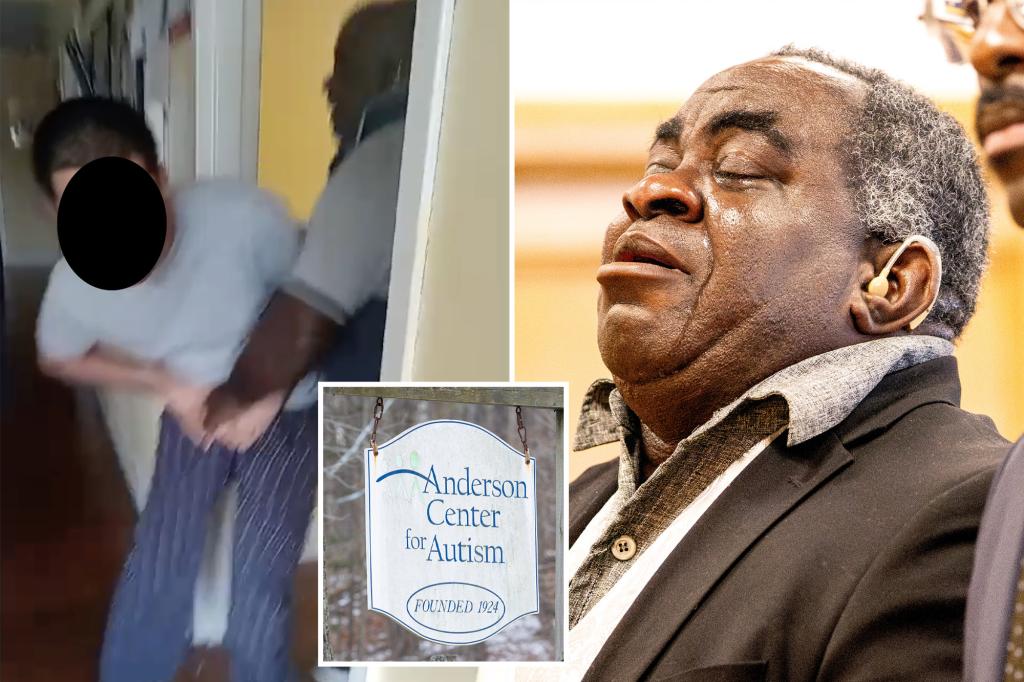Garnet Collins, a 51-year-old immigrant school aide employed at the Anderson Center for Autism in Staatsburg, New York, pleaded guilty to a felony charge of endangering the welfare of an incompetent person. This plea stems from a horrific incident captured on video where Collins is seen grabbing and dragging an autistic teenage student by his testicles. The incident has sparked outrage and calls for greater oversight and protection for vulnerable individuals in residential care facilities. Collins’ actions represent a severe breach of trust and a blatant disregard for the well-being of a student entrusted to his care. The Anderson Center, which receives substantial public funding from New York City and state taxpayers, has been thrust into the spotlight due to this egregious act of abuse.
The video evidence, recorded by a fellow aide who subsequently lost their job for whistleblowing, depicts a disturbing scene where Collins aggressively manhandles the autistic teen while yelling, “Go to your room!” The young man’s cries of pain and pleas to call his mother are heart-wrenching testaments to the trauma he endured. The victim’s father has expressed his anguish and concern for his son’s long-term mental health, noting that the teenager continues to suffer from the psychological scars of the assault, experiencing flashbacks and nightmares. The incident has understandably left the family deeply traumatized and demanding justice.
The abuse revealed by the video is not believed to be an isolated incident. The whistleblower who filmed the assault testified that similar incidents were commonplace at the Anderson Center and that supervisors frequently ignored or downplayed reports of abuse. This alarming revelation suggests a systemic problem within the institution, raising serious questions about the adequacy of its safeguarding procedures and the accountability of its staff. The victim’s father has called for a thorough investigation into potential criminal negligence on the part of the Anderson Center’s administration and has advocated for mandatory surveillance cameras in public areas of similar facilities to deter abuse and ensure accountability.
Collins initially attempted to downplay the severity of his actions in court, claiming he merely held the student by the waist. However, under questioning from Judge Edward McLoughlin, he ultimately admitted to grabbing the teenager by his genitals and causing him pain. In addition to this assault, Collins also admitted to striking another autistic student in the head with a laptop, an incident that resulted in bruising but which was dropped as part of his plea deal. The judge, acknowledging the profound impact of Collins’ actions on the victims and their families, expressed his understanding of their distress and acknowledged the lifelong consequences they might face.
Collins, a permanent resident but not a U.S. citizen, faces a prison sentence of one to three years. However, his guilty plea carries the additional consequence of potential deportation. The judge informed Collins that he could be paroled to immigration officials at any point after beginning his prison term. While Collins expressed remorse in court, sobbing and invoking the name of Jesus, the gravity of his crimes and the potential for long-term psychological damage inflicted on his victims cannot be overlooked.
The victim’s family and their legal representation believe the sentence is inadequate, reflecting a broader societal issue of underestimating the seriousness of abuse against disabled individuals. The case has brought to light the urgent need for stricter oversight and more robust protective measures within residential care facilities. The family’s lawyer, Ilann Maazel, criticized the leniency of the sentence, arguing that it is indicative of a systemic failure of law enforcement to adequately address the abuse and neglect of disabled people. The case highlights the need for greater awareness, stronger legal protections, and more effective enforcement to ensure the safety and well-being of vulnerable individuals in institutional care.

